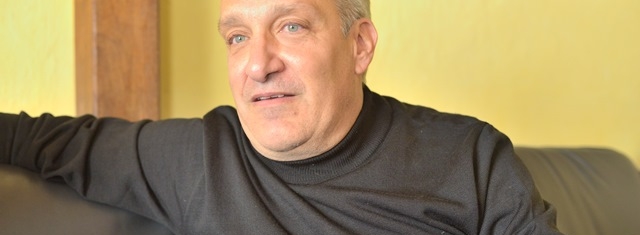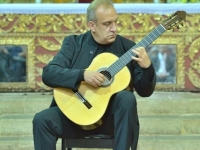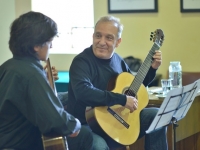Arts
Stephen Marchionda
Passionate for Scarlatti

Stephen Marchionda (Source: Roberto Orrú, italian photographer)
USPA NEWS -
Stephen Marchionda is an Italian-American guitarist. He was born in Sulmona, Abruzzo in Italy, and began playing the piano when he was 8 years old. Nowadays, he is considered one of the greatest guitar performers who is well-known for his Scarlatti's passion.
Marchionda´s first time in Colombia could not be better. He visited five cities of this country as one of the guests of the 6th version of Guitar´s Week, organized by the Banco de la República on its 90 anniversary. In his concerts he presented works of Antonio José, Isaac Albéniz, Domenico Scarlatti and Enrique Granados. This one the guitarist says he has recently falled in love with.
According to what we perceived, Stephen Marchionda has a deep connection with Spaniard and Latin sounds, not only for his roots as an Italian descendant, but because of his academic background.
“I have been my whole life playing guitar. I started when I was 8 years old with piano during 4 or 5 years, with a Russian teacher; then I began playing guitar with a teacher from Venezuela who studied in Spain with Regino Sáinz de la Maza, who was a very important guitarist“.
Even though he left the piano behind, his relationship with the instrument is deeply respectful. He says, the music of piano has a longer history than the one of guitar, and he also feels admired by composers who can sit down and achieve what they want in front of the instrument. Actually, one of his musical influences is Domenico Scarlatti, a composer who originally wrote for Keyboard and whose music has Marchionda made incredible arrangements for guitar.
Even though he left the piano behind, his relationship with the instrument is deeply respectful. He says, the music of piano has a longer history than the one of guitar, and he also feels admired by composers who can sit down and achieve what they want in front of the instrument. Actually, one of his musical influences is Domenico Scarlatti, a composer who originally wrote for Keyboard and whose music has Marchionda made incredible arrangements for guitar.
“He [Scarlatti]wrote for harpsichord, and I think that to understand him I based myself in the point that Scarlatti was imitating Spanish music and imitating the guitar and that helps in a way, but I also want to keep harmonics“, says Stephen.
He thinks many transcriptions for and from the piano, orchestra or guitar tend to ignore this aspect of transposition. “I had a wonderful teacher in Yale who explained the importance of the accidental notes, the dissonances, and many people who make the transcriptions erase those dissonances and you must keep them because that is the personality of the piece“.
He thinks many transcriptions for and from the piano, orchestra or guitar tend to ignore this aspect of transposition. “I had a wonderful teacher in Yale who explained the importance of the accidental notes, the dissonances, and many people who make the transcriptions erase those dissonances and you must keep them because that is the personality of the piece“.
While listening to Stephen, it is evident that his results in transcriptions get impressive results, especially because he understands the works to preserve its originality but also turns them into “new“ masterpieces. When you hear Stephen´s performance, you imagine the sounds of harpsichord which are perfectly accomplished for the guitar and the musician himself.
His sound and technique is effortless; he does not boast of speed or tries to show the loudest chords, and these choices in a concert make the audience be more connected and attentive to him. For Stephen, getting this relationship with the audience comes from two sides.
His sound and technique is effortless; he does not boast of speed or tries to show the loudest chords, and these choices in a concert make the audience be more connected and attentive to him. For Stephen, getting this relationship with the audience comes from two sides.
The first one: be absolutely prepared. “I think you have to listen to all the music, composers, recordings and performances and people who know how to play that music well. If you listen to Antonio Lauro, Alirio Diaz, or Enrique de la Rocha playing Enrique Granados, you will understand, perfectly, is there, but playing them is another story“.
Besides, he gives particular importance to playing “unplugged“. “In a lot of other places I don´t need the microphone; I prefer not to play with it when I don´t need. Actually I was a little surprised by the size of the audience last night [during his last concert in Colombia] but the fact that if I can hear them at the back I know they can hear me. I prefer to play like it was 100 years ago, and actually I practice acoustically so that there´s nothing between you and the audience.“
Just like that, like 100 years ago, Stephen does his performs; he enjoys Spain and from the past six months ago, explores composition techniques with a flamenco singer, Rocío Márquez; he works on his wonderful sound and musical flow hand-in-hand with Enrique Granados; and keeps developing his transcriptions of piano works by Scarlatti, Albéniz and other composers.
Meanwhile, he prepares the next tour to Brazil, and his Latin fans wait for some other concerts, records and memories of the man who has become one of our favorite guitar players.
Meanwhile, he prepares the next tour to Brazil, and his Latin fans wait for some other concerts, records and memories of the man who has become one of our favorite guitar players.
Liability for this article lies with the author, who also holds the copyright. Editorial content from USPA may be quoted on other websites as long as the quote comprises no more than 5% of the entire text, is marked as such and the source is named (via hyperlink).







